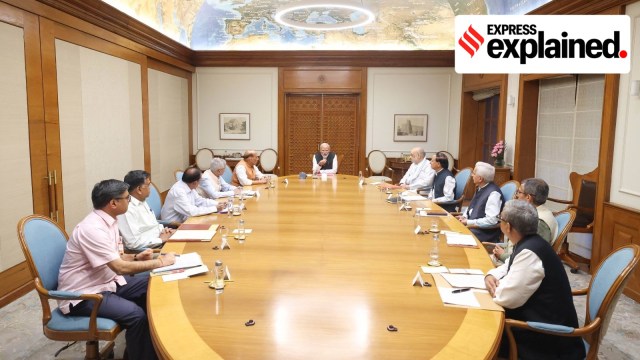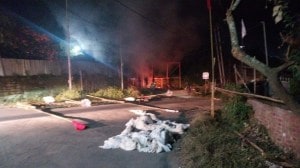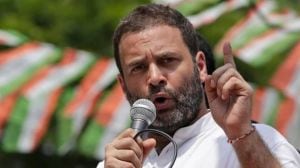Noting “the cross-border linkages of the terrorist attack” in Pahalgam on Tuesday (April 22) that led to the deaths of 26 people, the Cabinet Committee on Security (CCS) on Wednesday announced a series of extraordinary retaliatory measures against Pakistan.

Foreign Secretary Vikram Misri made the announcement following a 2.5-hour-long meeting, which was chaired by Prime Minister Narendra Modi as the head of the CCS. Home Minister Amit Shah, Defence Minister Rajnath Singh, External Affairs Minister S Jaishankar, National Security Advisor Ajit Doval, Cabinet Secretary, and Secretaries of the ministries of Home, Defence, Finance and External Affairs were also in attendance.
Story continues below this ad
What is the Cabinet Committee on Security (CCS)?
With the Prime Minister at the helm, the CCS includes the cabinet ministers holding the big four portfolios of Finance, Defence, Home Affairs and External Affairs as its members. It is responsible for debates, discussions and appointments of/ in the national security bodies. Major decisions with respect to significant appointments, issues of national security, and defence expenditure are taken by the CCS.
It can also include the defence chiefs and other senior bureaucrats, depending on the situation and the nature of the discussion. Besides dealing with defence-related issues, the CCS brainstorms on issues relating to law and order and internal security, and policy matters concerning foreign affairs on security-related issues. It also considers matters relating to atomic energy.
What are Cabinet committees, in general?
Following general elections, once a Union Cabinet is sworn in and ministerial portfolios are allocated, the next step is the formation of the high-profile Cabinet committees. The Prime Minister sets up these committees with selected members of the Cabinet and assigns specific functions to these committees; both may later be modified.
The membership of each committee varies from three to eight. Usually, only Cabinet ministers are members of these committees. However, it is not unheard of for non-Cabinet ministers to be members or special invitees to committees. If the Prime Minister himself is a member of any such committee, he acts as the head of that committee.
Story continues below this ad
The committees resolve issues and formulate proposals for the consideration of the Cabinet and take decisions on matters assigned to them. The Cabinet is empowered to review such decisions. The Manmohan Singh government had as many as 12 Cabinet committees, apart from dozens of Groups of Ministers (GoMs) and Empowered Groups of Ministers (EGoMs).
There are eight Cabinet committees at present, including on issues such as Economic Affairs, Political Affairs, and Parliamentary Affairs. All committees except the Cabinet Committee on Accommodation and the Cabinet Committee on Parliamentary Affairs are headed by the PM.
When has the CCS been convened in the past?
CCS meetings have been called during major events in India’s history, including the wars with Pakistan, the Kargil conflict and the Kandahar hijack. However, the proceedings have generally not been released in the public domain and have emerged subsequently in bits and pieces through writings and memoirs.
The book GP: 1912-1995, edited by Ashok Parthasarathi, the Science and Technology Advisor to Prime Minister Indira Gandhi, recounts one such incident. On December 16, 1971, towards the end of the war with Pakistan over Bangladesh’s independence, Pakistan’s forces surrendered to the Indian Army in what was then East Pakistan.
Story continues below this ad
The book noted that Gandhi then called a CCS meeting. It was attended by Defence Minister Jagjivan Ram, External Affairs Minister Swaran Singh, Finance Minister YB Chavan and then Chief of Army Staff Sam Maneskhaw, among others. The meeting was to debate whether heading for Peshawar at that juncture was feasible, as Gandhi was keen to recapture Pakistan-occupied Kashmir (Pok). Gandhi took everyone’s views but decided against it, and a ceasefire was announced on December 17.
In 1999, following the hijack of the IC 814 aircraft carrying 179 passengers onboard, a CCS meeting was called. The events played out over several days, culminating in the Pakistan-linked hijackers landing the aeroplane in Kandahar, with Afghanistan then under Taliban control.
The Taliban was also involved in the negotiations with the hijackers, who demanded the release of three terrorists held in India. At a CCS meeting, External Affairs Minister Jaswant Singh volunteered to accompany the three Jaish terrorists to Kandahar for the release of Indian hostages. Subsequently, the hostage passengers and crew reached Delhi via two special flights, and the hijacked aircraft returned to New Delhi.








































